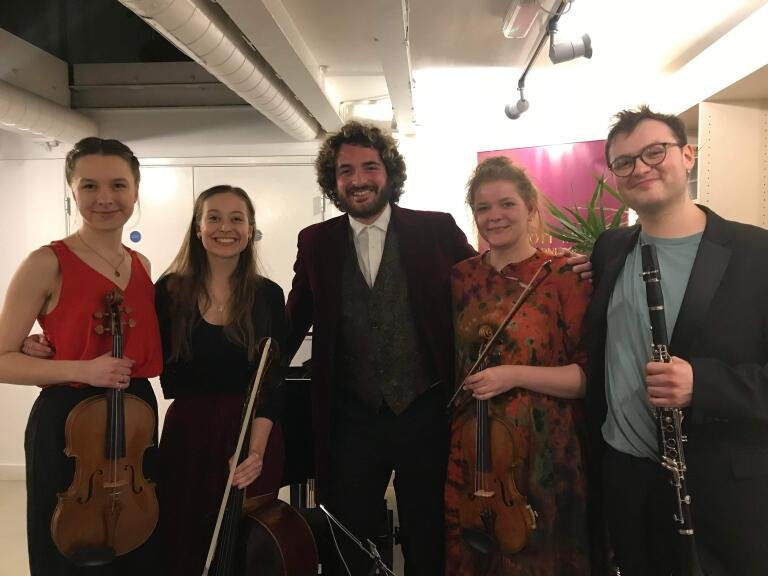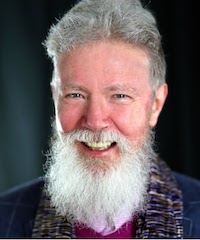
Noah Max (center) at the launch event for Songs of Loneliness with some of the artists appearing on the album (Photo: Midori Komachi)
By Robert Hugill
 Songs of Loneliness: Solos, Duos and Trios
Songs of Loneliness: Solos, Duos and Trios
Noah Max (Composer)
Raymond Brien (clarinet), Philip Haworth (oboe), Zoe Solomon (piano), Brompton Quartet, Barbican Piano Trio
Toccata Classics
This new disc from Toccata Classics features chamber music by the young composer Noah Max. Under the title Songs of Loneliness: Solos, Duos and Trios we have a “Sonatine for Cello,” “Sunset Sketches: Three Sonnets for Solo Piano,” “Sojourn” for string trio, “It Comes in Waves” for solo piano, “Cornucopia: Three Bagatelles for Solo Oboe” and “Vignette” for piano trio, performed by Raymond Brien (clarinet), Philip Haworth (oboe), Zoe Solomon (piano), members of the Brompton Quartet (Maja Horvat, Kinga Wojdalska, Wallis Power) and the Barbican Piano Trio (Sophie Lockett, Robert Max, James Kirby).
The music is all relatively recent, dating between 2018 and 2020, and in his booklet note, Martin Anderson talks about “the sense of loss pervading almost everything recorded here; where the music does not seem to be grieving, it is angry”. But for me it wasn’t so much the sense of loss as the nebulous quality to this music. There is great stylistic variety here, but in each piece the music seems to elude our grasp somewhat.
We begin with a piece written during lockdown for Max’s parents, cellist Robert Max and pianist Zoe Solomon, and here played by them. The “Sonatine for Cello and Piano” is a four movement work that moves between the achingly sad and the disturbing. The outer two movements both feature striking cello melodies that really ache (and Max mentions Rachmaninov as an inspiration), but the middle two movements take us to different words, disturbing atmospheres and floating spectral textures, where texture and timbre become more important than pitch.

‘It Comes in Waves,’ written in memory of a friend who died tragically at the age of nineteen. Solo piano by James Kirkby, as performed on Noah Max: Songs of Loneliness: Solos, Duos and Trios
“Constellations” for solo clarinet (Raymond Brien) is dedicated to a friend facing a life-threatening illness. It begins quiet and intense, but gradually gets spikier and angry as Max brings in both jagged harmonies and extended techniques. Brien gives a virtuoso performance of a work that seems to reflect both solitude and anger.
“Sunset Sketches: Three Sonnets for Solo Piano” (played by Zoe Solomon) is three movements (Dusk, Sunset, Stars), each of which tries to capture the sonnet form in music whilst evoking the sunset (in Frinton on Sea). The first is quietly thoughtful and melodic, with the harmonies never quite doing what you expect. The second starts more formally, before becoming more fractured in the middle and never quite recovering. The third is based around rocking chords, with an evocative lack of explicit melody.

‘Constellations for Solo Clarinet,’ dedicated to a friend facing a life-threatening illness, composed by Noah Max, solo clarinet by Raymond Brien as performed on Noah Max: Songs of Loneliness: Solos, Duos and Trios
“Sojourn” is a six-movement work for string trio (here played by members of the Brompton Quartet) that was written in memory of a family friend, Melanie Daiken (1945-2016) and is intended to evoke her personality. Introduzione and Mysterioso explore the contrapuntal possibilities of the trio, but in a way which seems more of a tentative exploration as the instruments fade in and out. Furioso is vigorous and energetic, still with the three instruments often independent. The language is highly chromatic but always hovers on the edge of tonality, or perhaps tonal centers. The fragile Intermezzo leads to a Maestoso which is quietly intense, and feels the still, serious heart of the work. The mood tries to continue in the Finale but disturbances appear leading to an uncertain end. Some of the movements are short, and they flow into each other in a way that creates a single, sectional whole.
“It Comes in Waves” is written in memory of a friend who died tragically at the age of nineteen. Written for solo piano (played by James Kirkby), it begins quietly and in rather a painterly manner (Max is a painter as well as a musician) but gradually develops in intensity, though the music never quite manages to sustain a consistent mood, as if the effort were too much. Despite moments of power and intensity, the end gradually dies away in uncertainty.
“Cornucopia: Three Bagatelles for Solo Oboe” (played by Philip Haworth) are operatically inspired. The first movement reminiscent of the oboe writing of RVW or one of his pupils, melodic yet also with eerily disturbing elements. The second movement vividly combines dazzling fingerwork with multi-phonics in a way that is highly dramatic. Finally we return to a more lyrical, melodic world.

‘Vignette for Piano Trio,’ inspired by the writings of Arthur Schnitzler and composed by Noah Max, performed by The Barbican Trio, from Noah Max: Songs of Loneliness: Solos, Duos and Trios
The last work on the disc is “Vignette” for piano trio (played by The Barbican Trio). This is a single movement work inspired by the writings of Arthur Schnitzler. It begins with a somewhat disturbing piano solo, whose effect is rendered more intense by the contributions of the strings leading to moments that are vivid, vigorous and intense. Melodic material is subservient, here, to texture and timbre, along with an interest in exploring how the three instruments can interact.
Many of the movements on the disc are quite short, as Max’s music displays a remarkable changeableness of mood. And he is similarly varied in his adoption of style, he seems to write the music which fits the moment rather than having a prescriptive attitude. At times the disc can feel a little fragmented and I would have rather liked one more larger work to anchor things, but this is a dazzling demonstration of his stylistic versatility and musical confidence. I would hesitate to call this a portrait disc, as the music here with its sense of isolation, loneliness and nebulous qualities does not quite reflect all aspects of the Noah Max that I know, but then when sitting in our studies writing we all travel to different places.
Reviews published here by permission of Robert Hugill at Planet Hugill, a singer, composer, journalist, lover of opera and all things Handel. To receive Robert’s lively “This month on Planet Hugill” e-newsletter, sign up on his Mailing List. (Robert Hugill photo by Robert Piwko. This review was published at Planet Hugill on 22 April 2022.)




